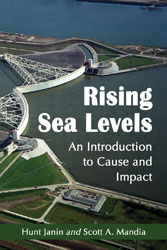Junior College Students Put Climate Science Zombies Back Underground Thanks to Skeptical Science
I teach MET103 – Global Climate Change to first and second year community college students. MET103 is a three credit lecture course that serves as a science elective for the general student population. Basic high school algebra is the only prerequisite. (See the course outline.)
I used John Cook’s SkepticalScience.com as the student resource for this semester’s research papers. As you will see from the three example papers highlighted on this blog, information found at SkepticalScience.com is accessible to the typical college student and thus, to the general public.
The assignment:
Each student chose a topic from Skeptic Arguments & What The Science Says. Students were asked to carefully study all the information appearing in the Basic, Intermediate, and Advanced tabs. Students were required to summarize, in their own words, the information learned from researching the topic. Students were also encouraged to use other resources, especially course notes, to help them complete the paper.
Skeptic Argument: It’s the Sun debunked by Robert Necci
Excerpt:
Now, armed with a basic understanding of how the Sun’s energy affects Earth and a basic understanding of the Greenhouse Effect, it is possible to dissect the argument made by those who deny climate change using the argument “It is the Sun.” The first evidence we can examine is temperature versus solar activity. According to Cook, Leahy, and Russell, “Over the last 35 years the Sun has shown a slight cooling trend. However global temperatures have been increasing. Since the Sun and climate are going in opposite directions, scientists have concluded that the Sun “cannot be the cause of recent global warming” (Cook, Leahy, & Russell, 2010). The available evidence lends credibility to the authors statement. There are several independent studies of solar activity that have shown that since 1960 the Sun has been in a slight cooling trend while the global average temperature has skyrocketed over that same time period.
Skeptic Argument: Hurricanes Aren’t Linked to Global Warming debunked by Mike Santalucia
Excerpt:
In a warming world, frequency is not the only issue many coastal areas have to deal with. As waters warm, the intensity and size of these storms is increased considerably. This is mentioned in the Skeptical Science article when John Cook states, “Hurricane intensity is also highly correlated with sea surface temperature. This suggests that future warming will lead to an increase in the destructive potential of tropical hurricanes.” (Cook, 2010). In 2008, James B. Elsner published an article in Nature which revealed something disturbing that he discovered in measuring wind speed trends. “Elsner found weaker hurricanes showed little to no trend while stronger hurricanes showed a greater upward trend. In other words, stronger hurricanes are getting stronger. This means that as sea temperatures continue to rise, the number of Category 4 and 5 hurricanes hitting land will inevitably increase.” (Cook, 2010). Warmer sea surface temperatures also add to the already severe issue of sea level rise as warmer water takes up more space. The issue of melting glaciers and ice sheets compounded with the rising temperatures are raising sea levels every day. With more intense storms pushing to the coast, the increased risk of storm surge damage becomes an issue. Hurricane Sandy showed record sea levels due to a “perfect storm” of high tide, rising sea levels, and storm surge. If storms of this strength or higher become a common occurrence in a world where sea levels are rising, it may soon become impossible to live by the coast at all. Increased moisture levels in the atmosphere also brought about by the warmer climate of today helps to increase the rainfall during tropical storms, which only adds to the flooding already caused by the storm surge. Soaked ground and weakened root systems also become a danger to inland residents as well at this point. Many large trees reside in suburban and rural areas likely to be hit by tropical storms and this danger to life and property is just another downfall of increased power in these storms.
Skeptic Argument: Ice Age Predicted in the 70s debunked by Anthony Buonasera
Excerpt:
For years, global warming deniers have proclaimed that in the 1970s, climate change was predicted to go in the opposite direction it is currently projected to head toward; taking the Earth into a global cooling trend, rather than the sharp spike in warming that is happening and is predicted to continue. This argument is not only a pointless squabble, but is incorrect and nitpicking small suggestions made in popular magazines that are not peer reviewed or accredited by the scientific community.
The reason for the argument’s continued use is that, from the deniers perspective, if scientists predicted global cooling in the 1970s and were wrong, then we cannot trust the scientific warnings now, that global warming is real and getting worse. However, glaring problems exist in that line of thought. Most of the climate deniers cite two articles from the 1970s as the basis of their argument; a Time article from 1974, and a Newsweek article from 1975. Both discuss at length the possibility of a cooling trend that could have an impact on the Earth’s climate.
Note: All three students gave me permission to post their papers wit names included.
Other student papers from previous semesters may be viewed here and here.


Reblogged this on acckkii.
acckkii
June 20, 2013 at 2:38 pm